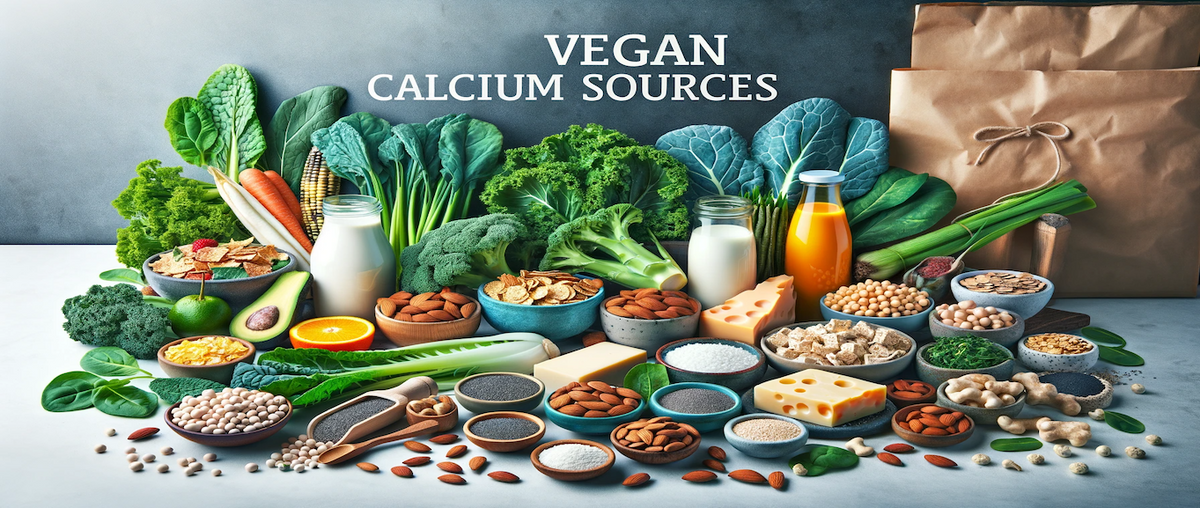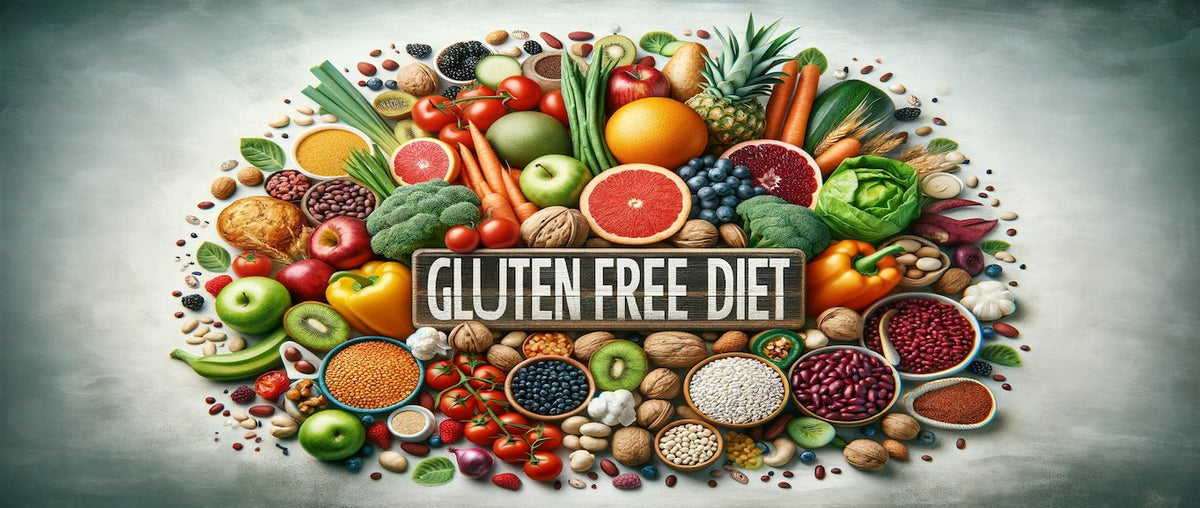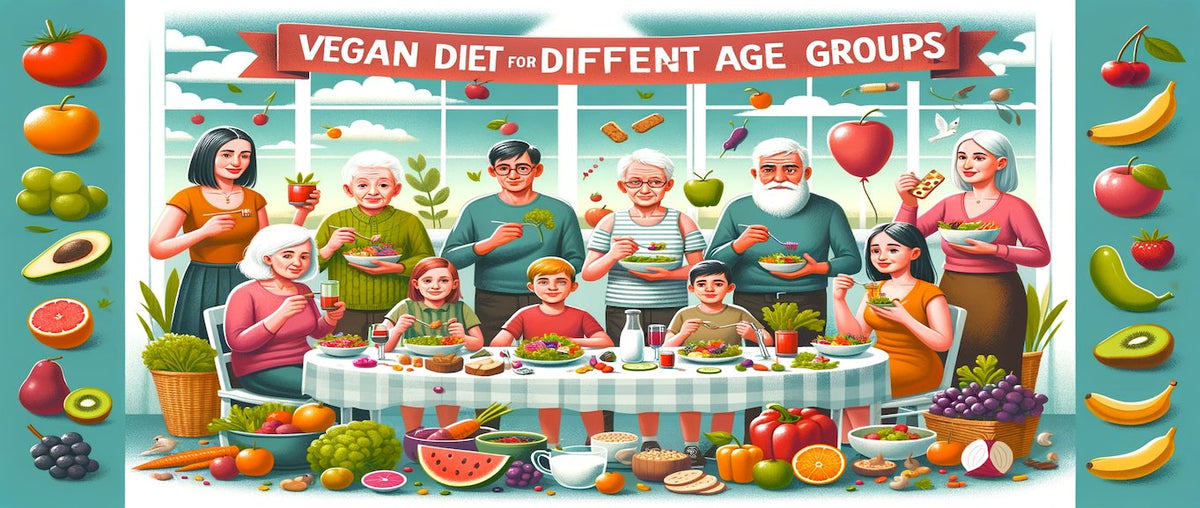Vegan Calcium Sources
Calcium is a vital mineral, essential for maintaining strong bones and teeth, and plays a crucial role in muscle function, nerve signaling, and heart health. Traditionally, dairy products have been the go-to source for calcium, but what about those following a vegan diet? The good news is that there are ample Vegan products and plant based foods that are rich in calcium, and they come with the added benefits of being cholesterol free foods and often lower in calories.
Calcium in Vegan Diets
In recent years, the rise of Vegan Cheese, vegan butter , and plant based cheese options in the Vegan Shop aisles has made it easier than ever for vegans to enjoy their favorite foods while still getting their essential nutrients. Moreover, these vegan food products are not just limited to mimicking dairy; they also include a variety of beans, nuts, seeds, and greens, each offering a substantial amount of calcium.
Another advantage of sourcing calcium from plant based products is the additional nutrients they provide. Many vegan calcium sources are rich in other vitamins and minerals, contributing to a well-rounded, nutritious diet. Plus, for those concerned about fat intake, options like Fat Free Butter and Cashew Butter are great alternatives.
In this article, we’ll explore the best vegan calcium sources, ensuring you can maintain a balanced, calcium-rich diet without any animal products. From the leafy greens in your salad to the vegan mayo on your sandwich, you'll discover that meeting your calcium needs on a vegan diet is not just possible, but also delicious and varied.
Leafy Greens: A Powerhouse of Calcium
When it comes to vegan calcium sources, leafy greens are among the most nutrient-dense options available. Not only are they packed with calcium, but they also offer a plethora of other vitamins and minerals, making them a must-have in any plant based diet. Here's a closer look at some of the top leafy greens for your calcium intake:
1. Kale: A superstar in the world of health foods, kale offers about 101 mg of calcium per cup, cooked. It's also rich in vitamins K, A, and C, and is a good source of fiber. Kale can be enjoyed in salads, smoothies, or as a cooked side dish.
2. Collard Greens: These greens are not only high in calcium (providing about 267 mg per cup, cooked) but are also low in calories and high in dietary fiber. Collard greens can be a great addition to soups and stews or can be lightly sautéed with some vegan butter and garlic for a delicious side.
3. Spinach: Offering around 244 mg of calcium per cup when cooked, spinach is another excellent choice. It's also rich in iron, making it a dual-purpose ingredient for those on a vegan diet. Spinach can be used in salads, pasta dishes, and even in vegan food products like green smoothies.
4. Bok Choy: This Asian green provides about 158 mg of calcium per cup, cooked. It's also a great source of folate and vitamin A. Bok Choy can be stir-fried with other vegetables and a dash of soy sauce for a quick and nutritious meal.
5. Mustard Greens: With about 103 mg of calcium per cup, cooked, mustard greens offer a peppery flavor that can spice up any dish. They are also rich in antioxidants and fiber. These greens can be sautéed with vegan butter or added to hearty stews.
Incorporating these leafy greens into your daily diet is not only beneficial for your calcium intake but also boosts your overall nutrient profile. They can easily be added to various dishes, ensuring your meals are both nutritious and delicious.

Fortified Foods and Beverages
For those on a vegan diet, fortified foods and beverages are a fantastic way to ensure adequate calcium intake. Fortification involves adding nutrients to foods, and it's particularly common in vegan products. Here are some key fortified items to include in your diet:
1. plant based Milks: Many plant based milks, such as almond, soy, and oat milk, are fortified with calcium. A cup of fortified plant milk can provide as much calcium as cow's milk, making it an excellent choice for vegans. They are also often enriched with vitamins D and B12.
2. Cereals and Granola: Breakfast cereals and granola are often fortified with calcium and other nutrients. This makes for a quick and easy way to start your day with a calcium boost, especially when combined with fortified plant milk.
3. Tofu and Tempeh: Some brands of tofu and tempeh are fortified with calcium, which is used as a coagulant in these products. Tofu and tempeh are not only good sources of calcium but also excellent sources of plant based protein.
4. Fortified Orange Juice: For those who prefer a liquid option, fortified orange juice can be a refreshing way to consume calcium. It's also a good source of vitamin C, which aids in the absorption of calcium.
5. Vegan Cheese and Butter: Many vegan cheese and vegan butter products are now fortified with calcium. These products make it easy to add calcium to your diet without sacrificing the flavors and textures you love.
Incorporating these fortified foods and beverages into your daily routine can significantly boost your calcium intake. Plus, they often come with the added benefit of other essential nutrients, making them a valuable part of any plant based diet.

Nuts and Seeds: Small but Mighty Calcium Sources
Nuts and seeds may be small, but they're mighty when it comes to their nutritional value, especially in terms of calcium content. They are an integral part of any plant based diet, not just for their calcium but also for their healthy fats, proteins, and other minerals. Here's a look at some calcium-rich nuts and seeds:
1. Almonds: Among the nuts, almonds stand out for their calcium content, offering about 70 mg per ounce. They are also a good source of vitamin E and healthy fats. Almonds can be enjoyed as a snack, or you can opt for almond butter or plant based cheese made from almonds.
2. Chia Seeds: Chia seeds pack a substantial amount of calcium, providing about 178 mg per ounce. They are also rich in omega-3 fatty acids and fiber. Chia seeds can be added to smoothies, oatmeal, or used to make chia pudding.
3. Sesame Seeds: With about 87.8 mg of calcium per tablespoon, sesame seeds are a great addition to your diet. They are also rich in other minerals like zinc and copper. Sesame seeds can be sprinkled over salads, or you can use tahini, a paste made from sesame seeds.
4. Poppy Seeds: These tiny seeds offer about 126.5 mg of calcium per tablespoon. They are also a good source of fiber and oleic acid, a healthy fat. Poppy seeds can be used in baking or as a topping for bagels and bread.
5. Cashew Nuts: Cashews provide about 10.49 mg of calcium per ounce. While lower in calcium compared to some other nuts, they are a good source of magnesium and copper. Cashew butter is a delicious way to include them in your diet.
Also Read
Incorporating a variety of these nuts and seeds into your meals and snacks is an easy and tasty way to boost your calcium intake. Whether it's a handful of almonds as a midday snack or a sprinkle of chia seeds in your breakfast, these small additions can make a significant difference.

Legumes and Beans: Versatile Sources of Calcium
Legumes and beans are not only versatile and delicious but also an excellent source of calcium for those on a vegan diet. They are staples in many cultures around the world and are celebrated for their nutritional value, including their calcium content. Here are some legumes and beans you should consider:
1. Soybeans: As one of the richest plant based sources of calcium, soybeans contain about 175 mg of calcium per cup cooked. They are also a great source of protein. Soybeans can be enjoyed in many forms, such as edamame, tofu, tempeh, and soy milk.
2. White Beans: Offering about 125 mg of calcium per cup, cooked, white beans are a fantastic addition to your diet. They can be used in soups, stews, or as a base for vegan mayo.
3. Chickpeas: With about 80 mg of calcium per cup cooked, chickpeas are not just versatile but also a good source of protein and fiber. They can be used in salads, hummus, or roasted as a crunchy snack.
4. Lentils: Lentils provide about 37.6 mg of calcium per cup, cooked. They are also rich in protein and fiber, making them a hearty option for meals. Lentils can be used in soups, stews, or as a meat substitute in various dishes.
5. Black Beans: Black beans offer around 46.4 mg of calcium per cup, cooked. They are also a good source of iron and protein. Black beans can be used in Mexican cuisine, in burgers, or as a salad topping.
Incorporating these legumes and beans into your diet not only ensures a good intake of calcium but also provides other essential nutrients. They are easy to cook and can be used in a wide range of recipes, making them a convenient option for anyone following a plant based diet.

Conclusion: Embracing Calcium-Rich Foods in a Vegan Diet
Embracing a vegan lifestyle doesn't mean compromising on essential nutrients like calcium. As we've explored, there are abundant vegan calcium sources ranging from leafy greens and fortified vegan products to nuts, seeds, and legumes. Each of these foods not only provides the calcium necessary for strong bones and overall health but also offers a variety of other nutrients beneficial for a well-rounded plant based diet.
Incorporating foods like kale, almonds, tofu, and chickpeas into your meals can ensure a sufficient calcium intake. With the increasing availability of fortified plant based foods and vegan food products like vegan cheese, vegan butter, and plant based cheese, it's easier than ever to enjoy delicious and nutritious meals that cater to your calcium needs.
Remember, a varied diet is key. Mixing different sources of calcium will not only keep your meals interesting but also ensure a broader intake of other essential nutrients. Whether you're a long-term vegan or just starting, understanding and utilizing these calcium-rich foods can make your journey both healthful and enjoyable.
Craving a delicious vegan meal? Look no further! We've got a guide to the best vegan restaurants in India, ready to help you discover amazing plant-based eats in your city.










